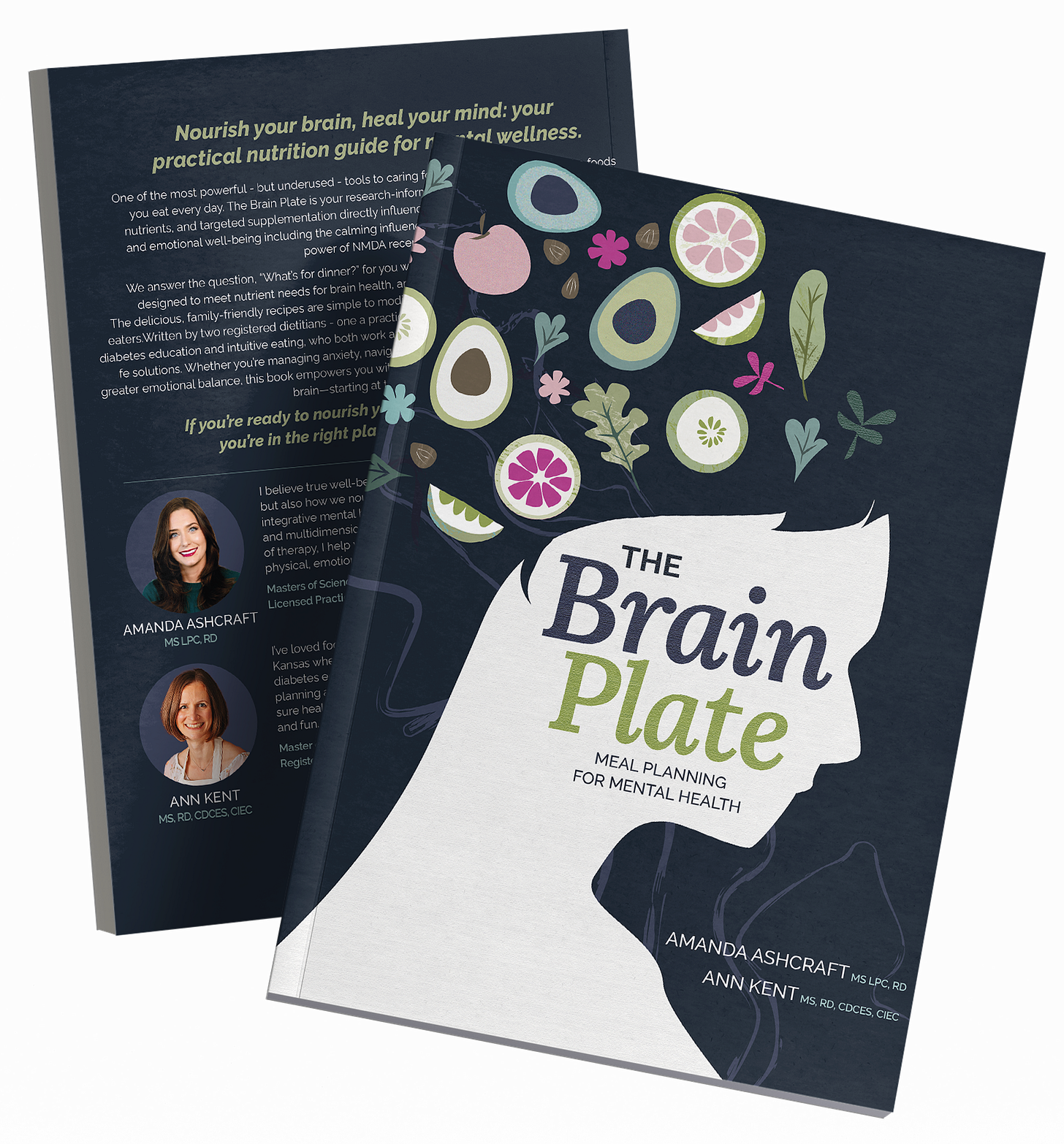Order Up! The Brain Plate is Here! How to Feed Yourself When It’s Hard
The brain and body connection conversation with Amanda Ashcraft and Ann Kent, authors of “The Brain Plate”
The Brain Plate is officially out in the world! We first introduced the book in May, during Mental Health Awareness Month, and now we’re back with authors Amanda Ashcraft and Ann Kent—two working moms, dietitians, and mental health professionals—for a deeper dive into what makes this book so different. 👉 Get your copy here 🎉
You can revisit the first half of this interview with Ann and Amanda right here.
The Brain Plate: Cookbook, Meal Plan, and Supplement Guide for Mental Health
The Brain Plate is part cookbook, part meal plan, and part supplement guide—all rooted in science and packed with support for your real life. In our first conversation, Amanda and Ann shared how the book came to be and why it’s so different from typical “eat better” advice.
Whether you’re navigating therapy, meds, burnout, or brain fog, this book helps you connect the dots and nourish your mental health without restriction, guilt, or overwhelm. In today’s conversation, Amanda and Ann share practical tips for those hard days—when energy is low, brains feel foggy, and motivation is nowhere to be found. We also talk about why the supplement section is food-first, how Ann’s app connects to the book, and what it really means to support mental health at the family dinner table.
📘 The Brain Plate: Cookbook, Meal Plan, and Supplement Guide for Mental Health
Created by dietitian moms Amanda Ashcraft and Ann Kent, The Brain Plate is a new kind of resource for anyone navigating burnout, brain fog, therapy, meds, or parenting on low fuel. It’s part cookbook, part meal plan, and part supplement guide—all rooted in science and packed with support for your real life.
Inside, you’ll find:
✨ Nutrition + brain health basics
🥗 A 4-week meal plan with easy, delicious recipes
📚 Modifications for gluten-free, dairy-free, vegetarian, and vegan eaters
💊 A practical guide to mental health supplements (and how to know if you need them)
🛠️ Troubleshooting for ADHD, anxiety, depression, low motivation, and more
Eating a balanced diet — or meal planning — can feel like so much, especially when you're already struggling. How do you make it feel doable?
What kinds of mental health challenges does the book help with?
Amanda: That’s an important part of the book. We have an entire troubleshooting section in the back that addresses the most common barriers to meal planning and eating well—especially when mental health is involved. We include tips for things like:
ADHD – Time management, memory issues, task initiation
Depression – Low motivation, appetite changes, energy dips
Anxiety – Spiraling, overthinking, decision fatigue
We offer scripts and mindset shifts like, “Here’s what to say to yourself when you’re overwhelmed,” or “Try this simple meal-building strategy when you have no energy.”
Ann: I think what’s really special is that Amanda wrote that section from her experience working directly with clients. It’s not just general advice. And we make it clear: frozen meals, prepped shortcuts, or asking for help—those are all valid strategies.
It’s meant to meet people where they are. No shame. No overwhelm. Just small, supportive steps.
Is the supplement section of the book focused on adults or kids, or both?
Ann: It’s mainly geared toward adults, just because kids’ nutrient needs vary so much by age and stage. But we do include notes for parents, especially where caution is needed—like avoiding excess electrolytes or overlapping vitamins in multivitamins and drinks.
Amanda: And we emphasize food first. It’s really hard to overdo nutrients when you’re eating real food. Supplements can be helpful, but mega-dosing individual nutrients without guidance can cause problems.
If you’re feeding kids the meals in this book, are they naturally getting what they need?
Ann: Absolutely. The recipes were designed with brain health in mind—things like omega-3s, fiber, protein, and phytonutrients. So when you use the meal plans, your kids are already getting a great foundation. We also include guidance on choosing quality supplements: looking for third-party testing, simple ingredients, expiration dates—those basics apply whether it’s for adults or kids. Just make sure any children’s supplements are age-appropriate.
Ann, how does your app 🍽 Peas & Hoppiness 🫛 connect to the book?
Ann: The recipes in the book are more targeted toward brain health—like we include more fish and nutrient-dense ingredients—but the app covers broader family meal needs too. The structure of the cookbook follows the same format I use in the Peas & Hoppiness app. So if you love the book and want to make meal planning even easier, you can subscribe to the app and get the same recipes and meal planning tools digitally—with automated shopping lists and weekly meal plans. You’ll even have access to extra features such as picky eater resources & recipe tips, and robust dietary substitutions and modification capabilities.
🎉 One Potato readers can try the app for free for 30 days with code ONEPOTATO30. Click here to sign up!
Final thoughts for parents trying to take care of themselves during hard seasons??
Ann: Feeding yourself well is part of taking care of your mental health. And when you care for your own brain and body, it helps you show up for your kids. It doesn’t have to be a big overhaul—just start with small steps.
Amanda: And don’t underestimate your influence. The way you talk about your meals, your body, your energy—that teaches your kids how to relate to food and themselves. You’re showing them that it’s okay to care for yourself. That it’s worth it. Model what you want them to learn, and keep it positive.
📘 Order your copy of The Brain Plate on Amazon (paperback + Kindle available!)
💬 Try the Peas & Hoppines Meal Planning app with code ONEPOTATO30
🎯 And remember: Progress, not perfection. You’re doing great.



